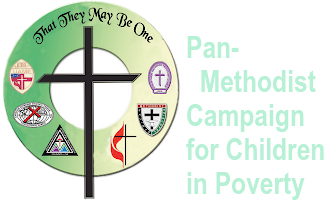I. Educate the Congregation about the Needs of Children and the Poor
Goal: To sensitize Methodist congregations to circumstances faced by children and by poor families in order that churches might respond with acts of compassion and justice.
Assess the need of children in your community.
- Form a committee or task force.
- Speak with children, parents, school personnel, other churches, and organizations devoted to children.
- Report findings to the congregation.
Celebrate Annual Children’s Sabbath.
- Designate a Sunday in October, or another Sunday during the year, as Children's Sabbath.
- Order lesson plans and manuals for Children‟s Sabbath from the Children‟s Defense Fund: https://www.childrensdefense.org/programs/faith-based/childrens-sabbath-celebration/.
- Use the materials, not only in worship on the designated Sunday, but in adult and children‟s school and weekday programs.
Consider the needs of all children:
- Ensure that your faith community is welcoming to children with disabilities. For information visit The Interfaith Disability Connection https://interfaithdisability.org/index.php/2019/02/05/the-faith-community-and-my-special-child/
- Implement support groups for children with disabilities or mental illness.
Host Church Programs that Focus on Children and Poverty.
- Hold a study series on the needs of children and the poor, by at least 10% of the adults in the congregation.
- Have a sermon series on the needs of children, with an emphasis on children in widely differing circumstances and communities.
- Hold a series (at least two sessions of seminars) on the needs of children in your community. Include one “hearing” with a panel of various community leaders and one “open mike” session to hear from parents and guardians.
Educate congregants on how they can respond to child abuse:
- Invite a representative from a local child abuse prevention program to talk with your faith community.
- Provide support for families under stress, especially single-parent families.
- Offer opportunities for parents and other caretakers to improve parenting skills and learn about children‟s developmental stages.
- Be certain that leadership of the church is acquainted with the Safe Sanctuaries book, a resource aimed at preventing child abuse in the church. To start a Safe Sanctuaries program in your faith community visit: https://www.umcdiscipleship.org/resources/gettingstarted-safesanctuaries.
Keep congregants posted on issues of children and poverty:
- Generate a monthly bulletin insert or electronic newsletter that gives updated information on the status of local, state and federal legislation affecting children and families, and statistics on children and poverty in your state.
- Place a Children and Poverty bulletin board in a strategic location in the church, updated regularly with information on poverty and issues such as hunger, housing and employment.

